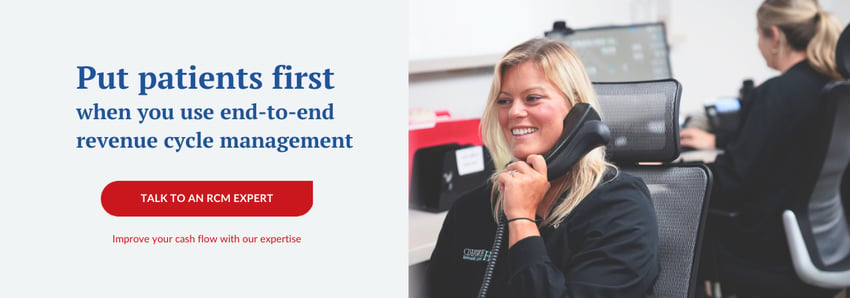5 common revenue cycle management questions answered for dental professionals


Revenue cycle management is key to a successful dental business, but it can be difficult to manage alone.
Both private practices and DSOs have revenue cycle management questions.
It’s important to understand the steps of the revenue cycle before seeking a skilled vendor, so you can better understand and evaluate their solutions.
Reviewing your challenges and current understanding helps you ask informed questions and make better decisions when choosing a vendor.
This article covers 5 common revenue cycle management questions:
- What are the 7 steps of the revenue cycle management?
- What’s the biggest obstacle to good revenue cycle management?
- What are some strategies to improve the revenue cycle?
- What are revenue cycle management solutions?
- Should I use revenue cycle management services?
1. What are the 7 steps of revenue cycle management?
- Patient registration: Appointment scheduled, patient information recorded.
- Insurance verification: Coverage details are updated in practice management software.
- Presentation and acceptance of treatment: Treatment, cost, and expected plan reimbursement are explained.
- Claim submission: Coding and documentation are checked for prompt reimbursement.
- Insurance payment posting: Payments received are recorded and applied to appropriate accounts.
- AR management: Outstanding claims are managed, monitored, and appealed.
- Patient collections: Payment is posted, patient is billed, and reminders are handled via tech tools.
Revenue cycle management ensures that your workflows across all these steps are as efficient as possible.
RCM is complex for any healthcare businesses. The systems that worked in the beginning rarely keep pace as your dental business grows. Knowing where to start can feel overwhelming, especially as your business keeps losing revenue. When you want to put patient care first, you need fast, reliable answers to your RCM questions.
That’s why speaking with a revenue cycle management service like DCS is a great strategy to find answers to your RCM questions quickly.
2. What’s the biggest obstacle to good revenue cycle management?
The biggest obstacle to good revenue cycle management in a dental business is often the complexity of insurance billing and coding. According to Tricia Ibrahim, an RCM product manager at Experian Health:
“Technology, regulations, changing contractual obligations and payer policies, people, processes, billing—each of these complexities adds to the challenge.”
Workflows must keep pace with ever-changing dental insurance policies, codes, and regulations. Outdated information leads to more errors, making it challenging for dental teams to accurately bill patients and receive insurance payments efficiently.
Other obstacles to good revenue cycle management include:
- Inefficient registration processes—especially insurance verification processes
- Legacy patient billing processes that don’t leverage automation and mobile devices
- A/R management that relies on write-offs instead of improvements that reduce denials and delays
A sound RCM strategy helps your dental business adapt to change by ensuring that each step is carried out correctly, efficiently, and with up-to-date information.
Related: Top 5 revenue cycle management problems dental teams and groups face
This leads us to some strategies for overcoming these obstacles.
3. What are some strategies to improve the revenue cycle?
Revenue cycle management improves revenue by minimizing the cost and effort to collect it. A well-run RCM ensures workflows are designed for efficiency. This means simplifying processes where you can, and seeking out necessary expertise.
- Automate claims processes. Use technologies to streamline claim submission, payment posting, and denial management.
- Streamline patient billing. Offer multiple payment options and online payment systems.
- Use analytics to guide improvements. Track metrics such as days in accounts receivable, claim denial rates, and first-pass resolution rates.
- Seek access to specialized expertise in coding, regulatory compliance, understanding of payer policies and best practices to improve workflows and patient communication.
- Leverage expertise with technology to reduce errors and increase efficiency.
- Partner with trusted RCM expert to:
- Automate your patient billing system
- Streamline insurance verification
- Submit accurate claims that are reimbursed upon first submission
- Have access to expertise on dental revenue cycle management
These are just a few strategies to improve your revenue cycle, and are easily implemented when you partner with RCM experts.
4. What are revenue cycle management solutions?
Revenue cycle management solutions are resources that shorten the time between the patient’s call for treatment, and your receipt of all payments.
Revenue cycle management solutions provide services and technology that support you in making your dental business operations streamlined and profitable.
Related: Defining end-to-end revenue cycle management for dentists: Deep dive
Revenue cycle management services provide access to experts to help you manage key steps of your process that impact your revenue. For example, DCS’ revenue cycle management services include:
- Provider credentialing
- Insurance verification
- Insurance billing
- Patient billing
RCM services allow dental businesses to maximize revenue, stay in compliance with regulations and deliver high-quality patient care.
5. Should I use revenue cycle management services?
For those facing new growth or longstanding revenue challenges, using revenue cycle management services is the best practice for the shortest path to improve the financial picture for a dental business.
If you’re asking “should I use revenue cycle management services?” also ask yourself these questions:
- Do I struggle to receive payment upon the first submission of an insurance claim?
- Is my team doing last-minute insurance verification, or do they hope the old data is correct?
- Are all write-offs necessary, or would cleaner workflows produce payments instead?
- Does my dental team have time to create the best experience for patients, or are they too bogged down with administrative work?
- Could I be collecting more?
If the answer is yes to any of these questions (especially the last one!), using revenue cycle management services is a solution worth exploring.
With RCM experts supporting your team by performing revenue-related tasks, you’ll see improved cash flow, and a better experience for your patients.
Ready to take the next step in your revenue cycle management journey?
More and more dental professionals are beginning to ask questions about revenue cycle management and what it can do for their dental business.
Understanding revenue cycle management (RCM), allows you to streamline your operations, increase your revenue, and provide your best patient experience.
By approaching your questions about revenue cycle management openly, you can learn more from RCM experts like DCS. And with expert guidance, you won’t have to do everything on your own.
By having expert support at each step of the revenue cycle, you will see higher insurance and patient collections, with fewer errors and missteps.
DCS is an end-to-end revenue cycle management provider that helps dentists sleep better at night, knowing they have ongoing support for the financial health of their business. To learn more about our revenue cycle management services, schedule a call with an expert.
Related Posts
Dental revenue resources from Dental Claim Support


